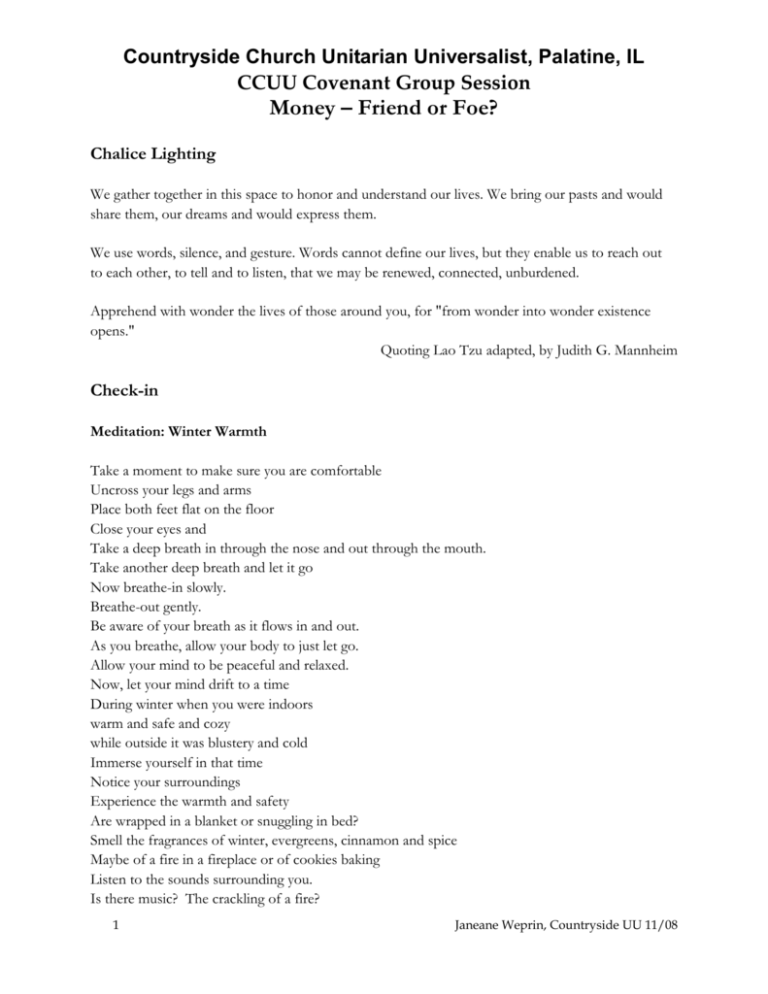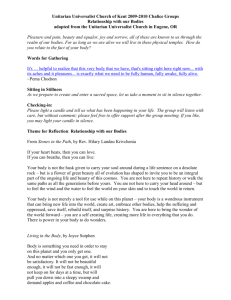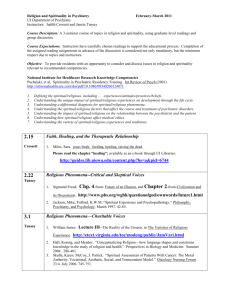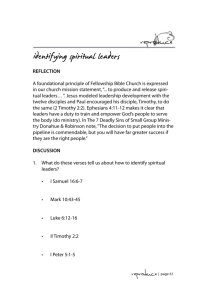Money--Friend or Foe?
advertisement

Countryside Church Unitarian Universalist, Palatine, IL CCUU Covenant Group Session Money – Friend or Foe? Chalice Lighting We gather together in this space to honor and understand our lives. We bring our pasts and would share them, our dreams and would express them. We use words, silence, and gesture. Words cannot define our lives, but they enable us to reach out to each other, to tell and to listen, that we may be renewed, connected, unburdened. Apprehend with wonder the lives of those around you, for "from wonder into wonder existence opens." Quoting Lao Tzu adapted, by Judith G. Mannheim Check-in Meditation: Winter Warmth Take a moment to make sure you are comfortable Uncross your legs and arms Place both feet flat on the floor Close your eyes and Take a deep breath in through the nose and out through the mouth. Take another deep breath and let it go Now breathe-in slowly. Breathe-out gently. Be aware of your breath as it flows in and out. As you breathe, allow your body to just let go. Allow your mind to be peaceful and relaxed. Now, let your mind drift to a time During winter when you were indoors warm and safe and cozy while outside it was blustery and cold Immerse yourself in that time Notice your surroundings Experience the warmth and safety Are wrapped in a blanket or snuggling in bed? Smell the fragrances of winter, evergreens, cinnamon and spice Maybe of a fire in a fireplace or of cookies baking Listen to the sounds surrounding you. Is there music? The crackling of a fire? 1 Janeane Weprin, Countryside UU 11/08 Do you hear the voices or laughter of loved ones? Take the next few moments to be in this time and place of warmth and love in winter. Gradually bring your attention back to your breath. Take a deep breath in and let it go. Come gently back into this room bringing the warmth and peace with you as you slowly open your eyes. Deep Sharing/Deep Listening Our subject for the deep haring/deep listening portion of the meeting is money. The pre-thinking material included questions and a reading about money’s meaning, power, and place in spiritual life Here are some questions to consider: The meaning of money – What does of money mean to you? How is your relationship with money? The power of money – Consider the power money has in our lives. How does money’s power affect you? Spirituality and money – How does money interconnect with spirituality for you? What do you think is the role of money in spiritual life? How has money’s meaning, power, and place in spiritual life been affected by the recent financial crisis? Have your ideas around those things changed recently? Check-out Closing Reading/Extinguishing the Chalice As we part now one from another, let these be our thoughts: If that which is most holy lies within the human person, and if the greatest power in the world shines flickering and uncertain from each individual heart, then it is easy to see the value of human associations dedicated to nurturing that light: the couple, the family, the religious community. For the power of good in any one of us must at times waver. But when a group together is dedicated to nurturing the power of good, it is rare for the light to grow dim in all individuals at the same moment. So we borrow courage and wisdom from one another, to warm us and keep us until we're together again. Eileen B. Karpeles “Pre-thinking” Food for Thought 2 Janeane Weprin, Countryside UU 11/08 Questions to consider for deep sharing/deep listening Reading The Spirituality of Money Rev. David Takahashi Morris Thomas Jefferson Memorial Church--Unitarian Universalist March 19, 2006 Writer and social activist Sharif Abdullah tells this story: “A few years ago, my finances were so bad that I went. . . for help. [My advisor] told me: ‘Money is a being, like a person. Assuming that this is true, what is your relationship with that being called Money?’ “I laughed out loud. ‘If money were a woman, she’d leave me for all of the bad things that I say about her!’ I started to tick off on my fingers my common complaints about money: You’re never there when I need you. I can’t rely on you. You hang out with all the wrong people. There’s never enough of you. You don’t really love me. You don’t support me. “I finished my litany with ‘No wonder money doesn’t stick around!’ And since that time, my relationship with money has changed to one of mutual respect and abundance—not seven figures, but comfortable enough for my simple lifestyle.” How’s your relationship with money? Most of us have some uneasiness about this. Money has power in our lives, and so often it seems to be a power beyond our control. If money itself can make us uneasy, perhaps it’s no surprise that talking about money makes us uneasy too. We’re guarded, even secretive; we don’t like to tell people how much money we make or have or need, and we don’t want them to tell us about theirs, either. Churches tend either to shy away from talking about money—or to talk about it too much. Some of us in Unitarian Universalist churches are especially uncomfortable with this. We don’t want to be in one of those churches that are constantly asking for money, telling their members that all their personal financial problems will be solved if only they’ll send in a few more dollars to Pastor Goldentongue’s Limousine Ministry. Yet the church can’t survive without money, especially in an era when marketplace reality has seriously diminished our available time for volunteer work. So in our uneasiness we alternate like public broadcasters between long periods of pretending money doesn’t exist and short, intense bursts of pleading—an annual Beggars’ Banquet with a side order of harangue. 3 Janeane Weprin, Countryside UU 11/08 I hasten to add that in recent Canvasses in this congregation, we’ve worked at moving away from this. We’ve focused on the church and its future, on your relationship with this community of faith. What does this place mean to you? That’s been our direction recently, and many of you have responded generously, just as (Gordon/Kip) suggested, matching your gift—your investment—as best you can to the meaning of the church in your life. Overall, we haven’t pleaded—not too much—for money directly. What we also haven’t done so much is concentrate on money itself—that powerful and powerfully symbolic tool about which we are so ambivalent. How does money intersect with the life of the spirit? It’s easy and, if you’ll pardon the pun, a little cheap to fall into the trap of treating money as if it were somehow soiled or unworthy of our full attention. That’s not the right path for us. After all, our religious tradition teaches that there’s no fundamental division between the spiritual and the material. Our religious ancestors rejected the notion that spiritual meant otherworldly; they taught—and we teach still—that the sacred is to be found in this world, this life—the place where money lives. What would happen if our relationship with money and our decisions about it grew out of a deep sense of money’s meaning, its power, and its place in a spiritual life? There is no part of living in our society and culture which money does not touch in some way. It is woven into our slightest and most profound experiences; it affects our choices and actions in ways both subtle and obvious. It influences even our most intimate relationships. Our connections with money go very, very deep. Money is intensely relational. It represents our whole global society’s promise and the hours and labors of all our lives. Money is the medium through which we exchange our time, our effort, and our imagination. Whether it’s checks, cash, credit cards, or electronic digits representing sums in accounts, our money is a promise that the exchange will continue, that someone somewhere will do something in exchange for the money that represents something that you or I have done. Adele Azar-Rucquoi says that money’s holy purpose is to link people in giving and receiving. It does link us, but the connection is not always holy. Money can be used abusively, or for control, or to manipulate. A research sponsor may use money to try to prevent unfavorable findings from being published, for example. A suspicious person may write a large check to a charity, but attach to it an array of demands for accountability that turns a gift into a torment. A grandparent may offer a college fund only if the grandchild attends their alma mater—and with the unspoken expectation of frequent visits to the grandparent for advice. It’s been said that money is a mirror of our identity. Perhaps this power of money to reveal us is some part of our uneasiness with it. Our colleague and friend Arvid Straube puts it bluntly: “If you want to know my real spirituality, look at my calendar—and my checkbook.” Now this is really uncomfortable. A record of our spending and receiving reveals our noble gestures, our quiet generosity, our commitments, our talents, and our priorities. It also reveals our compromises, our contradictions, the places where we haven’t yet been able to align our life with our professed and most deeply felt values. In a book called Money and the Meaning of Life, Jacob Needleman calls up the great spiritual epics of the world’s religions. Every culture has a great drama of meaning. A heroic character quests for some great truth and then tries to bring it back into the everyday world, in the face of tests and temptations, fears and resistance—all the inner and outer forces and impulses that stop us short of living our true life of wholeness, compassion, commitment, and joy. In each culture the 4 Janeane Weprin, Countryside UU 11/08 drama plays out on the stage that makes the most sense in that culture: Battles, deserts, mountaintops; the long search for Enlightenment; the quest for the Holy Grail. Money, Needleman says, is the field on which the modern drama of meaning takes place. The story of money in your life and mine is the story of our effort so far to give our spiritual truth a material life. Money is where we are tested and challenged, where we triumph and where we sometimes fail. Sometimes it is a heroic tale, full of high purpose and perseverance. Sometimes it is a tragedy, an account of temptation and falling short of our best. Sometimes it’s a farce. But the next chapter is waiting to be written every hour of every day, our whole life long. The spiritual purpose of money is to be a bridge over which our deep truth, our understanding and values cross over into the material world—or don’t. It’s not money’s fault if it doesn’t happen. The choice is ours, and we make it all the time. Whatever our financial situation, each and every one of us has some power to use money to give our spiritual life reality in the material world. We can claim that power at any time. And as we claim it and use it, it grows. How will you use your power? What meaning, what vision, what spiritual truth do you seek to make real in the world? http://www.uucharlottesville.org/sermons/2006/sermon_2006-03-19.html 5 Janeane Weprin, Countryside UU 11/08






